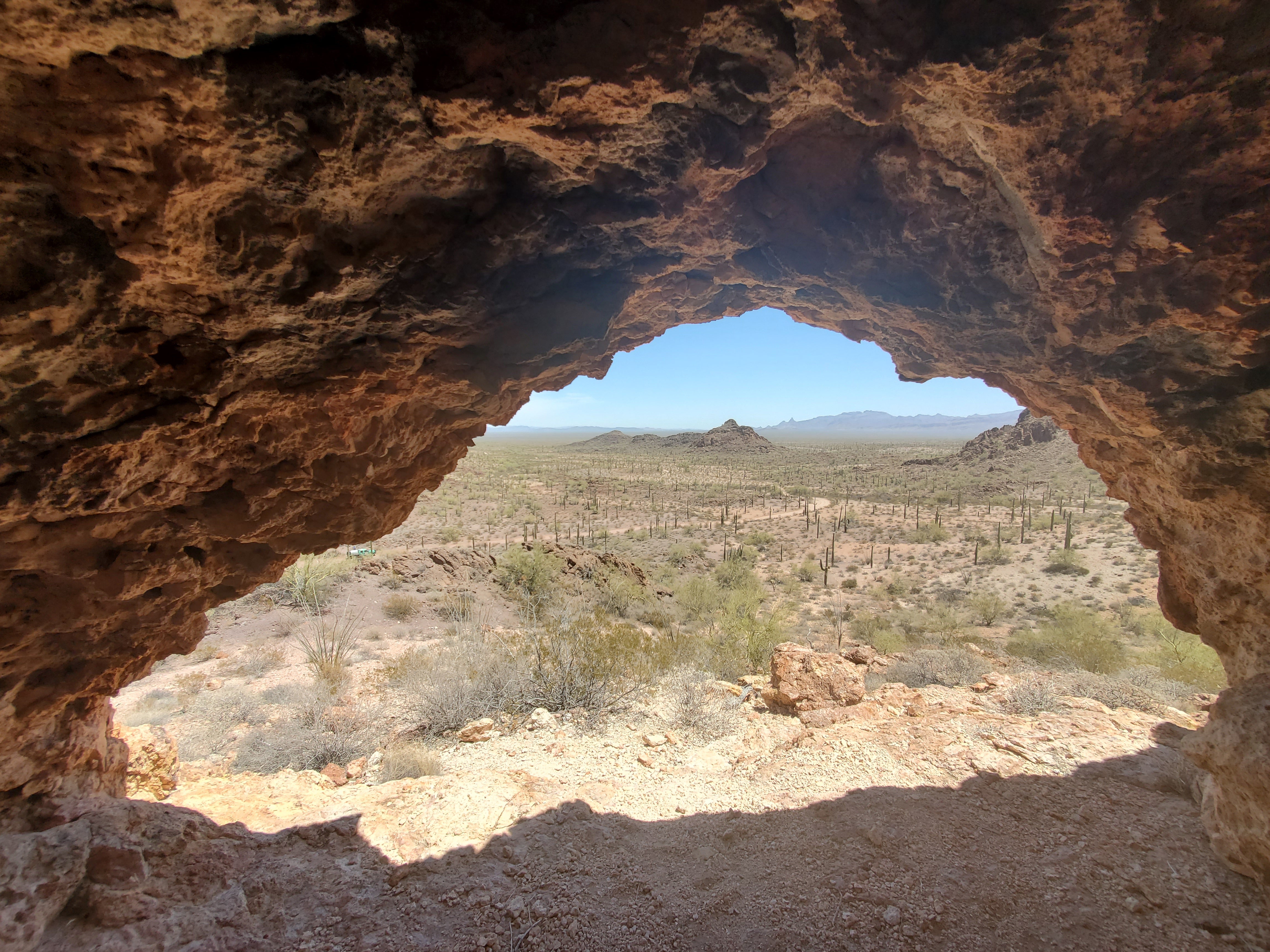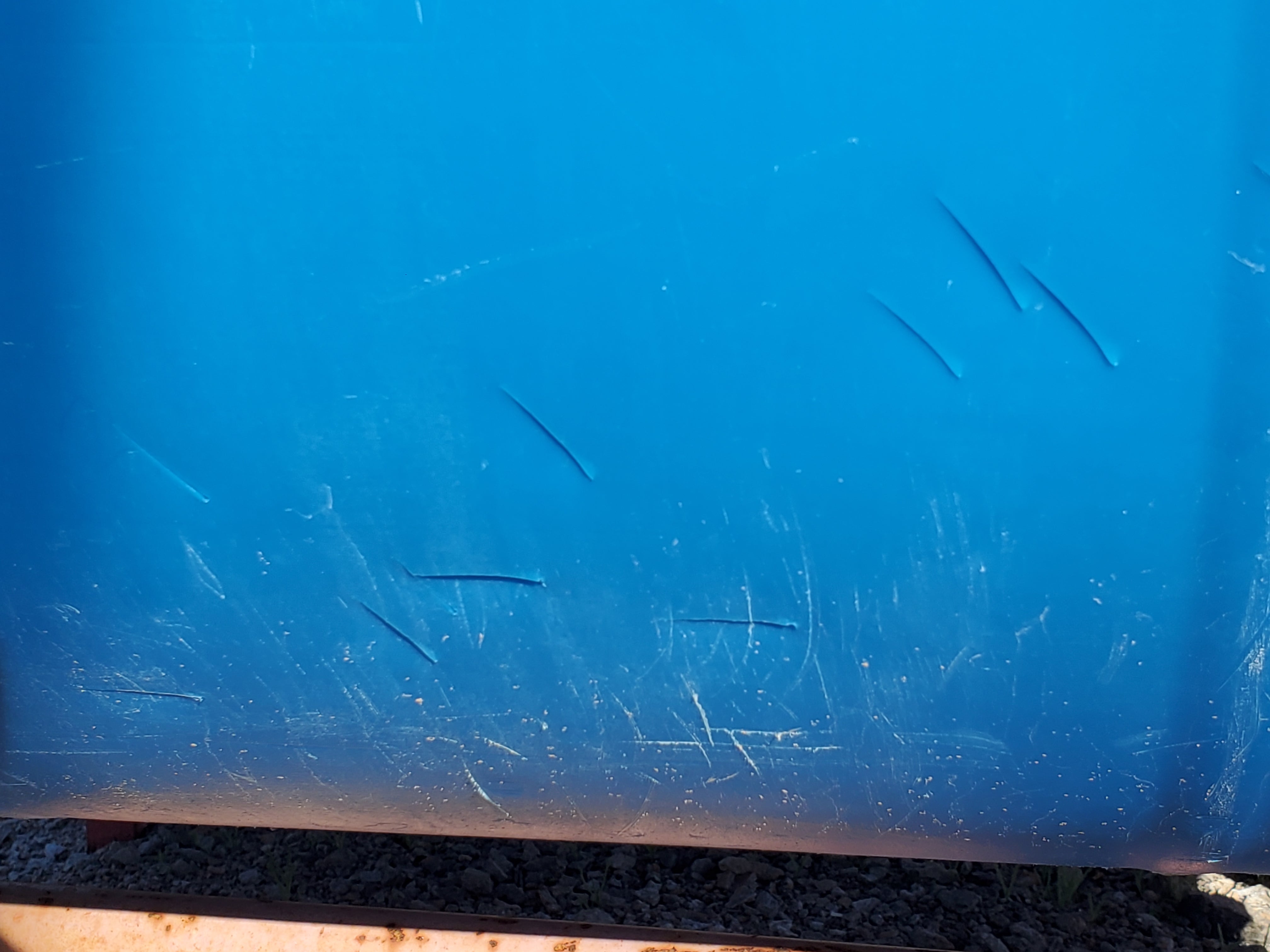Deadly intentions: Criminalizing human rights advocacy to deter life-saving aid
By Cherra Mathis | March 10, 2023
This blog was revised on May 4, 2023 to include updated information.

Photograph by Cherra Mathis, 2022.
As our old truck bumps over the monsoon-ravaged grit-and-gravel roads, I keep my eyes sharp, looking through the puffs of dust that our wheels kick up, up and down the arroyo on each side of the road, deep dry temporary stream beds carved by the seasonal rains. That’s part of our work – we’re taking water out to the water stations, but we’re also keeping an eye out for any sign of any person in crisis, regardless of citizenship status, who may have sought shelter in the rough scrub and the relative shade of the arroyo banks. They may need our support, may have run afoul of the brutality of the Sonoran Desert or Customs and Border Patrol (CBP). We’re well out of cell-tower range, off public roads and deep into the desert, and any flat tire or unpredictable gully-wash could set us adrift as well – only our GPS, pinging off the satellites, could alert a rescuer to our location if things went poorly. Of course, we also are in a large truck, with about 300 gallons of water tanked on its back, and water is a most precious resource out here. Most people crossing the desert out here don’t have that; they have the water they can carry, their documents, a cellphone, and hope.
Death in the Sonoran Desert is no rarity
(humaneborders.info/app/map.asp)
As the U.S.’s increasingly restrictionist immigration policies shut down safe and legal routes to obtain asylum, more and more people resort to this hazardous path through the unforgiving desert. In 2022, more than 2,300,000 people crossing the border were intercepted by CBP and forced back into Mexico; there are no clear numbers to document the number of migrating adults and families who successfully evaded Border Patrol. Many of the men, women and children crossing into the United States do not survive the journey, dying of heat, exhaustion, dehydration, hypothermia, and exposure in their efforts to find safety. While estimates of deaths in the desert vary, even the most conservative estimates are in the thousands, at the rate of approximately one person dying a day for the past two decades. More than a thousand people whose remains have been found in the Arizona desert remain unidentified; their bodies are often only found months after their deaths. Our policies have “weaponized the natural environment" to augment and enforce violent and dehumanizing border enforcement, with death in the desert as a deterrence strategy. However, those who seek to save lives may also be considered criminals.
Resisting for human rights
Communities along the border know and see the harms done to family and strangers. Organizations such as the Samaritans, Humane Borders, and No More Deaths engage in various forms of advocacy and direct action to offer life-saving support. I volunteer with Humane Borders, who obtain the permission of both the National Park Service, Bureau of Land Management, Fish and Wildlife Services, and Pima County to set consistent, established water stations at locations along the border, at sites informed by over 30 years of death-mapping. These sites see water usage from both hikers and migrating people, and represent an effort toward a collaborative response bringing together both the enforcement apparatus and activists who resist its harms. However, due to the fixed locations contingent on external permissions from the park system, these water station sites cannot respond as flexibly to the changing migrant trails in the desert, which adapt to avoid Border Patrol detection. Activists also worry that these water sites serve as “bait” for desperate people in the desert – whenever we refill the barrels, we look for tire tracks from CBP’s all-terrain vehicles, to try to figure out if they have been staking the sites out and detaining people who come for water there, although they promise that they are not. It’s an uneasy compromise, leaving people on both sides unhappy but maintaining a bastion of consistency. Other organizations address the human rights of migrating people outside of established permissions. Rather than requiring migrants to weigh the risks of proximity to established water drop sites against risks of Border Patrol detection, organizations such as No More Deaths bring the water, medical care, and life-saving resources to the people traversing the desert trails deep within the mountainous desert wilds. These organizations are explicitly motivated by the desire to uphold the human rights, dignity, and survival of people crossing the desert, taking “death out of the equation” and to “end suffering and death in the borderlands.”
Human rights and humanitarian aid

Muertes social media page, posted in 2019
Organizations that respond to rights violations such as No More Deaths are part of a larger tradition of “human rights defenders,” anchored in the belief that human rights are rights for all, regardless of nationality, status, or identity. Human rights do not begin at the threshold of one particular nation or another, nor do they end in the liminal border spaces such as the Sonoran Desert or the Mediterranean Sea. Many of these rights defenders are refugees and migrants themselves, drawing from their own experiences to shape safety for those still journeying. They work to collect information of rights violations to push for local, national and international accountability, and support people whose rights have been violated. Organizations responding in the desert seek to protect the right to life and safety, which are jeopardized as migrating people seek to pursue their other human rights: the right to asylum, to freedom of movement, freedom from arbitrary expulsion, and many others that may spur their journey. While the United States has signed and ratified many of the Human Rights conventions, it notably has neither signed nor ratified the International Convention on the Protection of the Rights of All Migrant Workers and Members of Their Families nor the International Convention for the Protection of All Persons from Enforced Disappearance.
Criminalization of rights work
Humanitarian aid organizations or individuals committed to rights-violation redress and accountability for harms done to people who migrate have seen their resistance to rights-violations increasingly criminalized. No More Deaths volunteers who publicized the destruction of humanitarian aid supplies by Border Patrol agents have found their organization targeted for arrests on grounds of littering and harboring undocumented immigrants. The “litter” refers to the jugs of water that No More Deaths volunteers have been leaving along the trails for more than a decade, to help protect migrating people’s rights to life in the excruciating desert climate. Border Patrol’s concerns about littering and protecting the environment, seemingly absent when evaluating the massive environmental harm of the border wall, hark to white nationalist and eco-fascist efforts to “preserve” America for white Americans, with immigrants as the convenient threat that brings them together. White supremacist sentiments that animate border enforcement and immigrant exclusion historically have found welcome allies and interest convergence with the U.S. environmental movements, who championed eugenics and sought to defend their delusions of white America and the manifest destiny of a rugged (white) frontier from the “invasion” of immigrants. Together they scapegoat people of color as a racialized threat to the United States, whether immigrant or indigenous, to be excluded, surveilled, detained, and dehumanized. Although the littering charges were overturned at the 9th Circuit, these legal maneuverings responding to efforts for Border Patrol to take accountability sure look like a warning to humanitarian aid workers, who see it as being “punished for offering help.”
Arizona human rights defenders are not alone finding their rights-work criminalized. Aid workers responding to thousands of drowned and dying migrating people crossing the deadly maritime border from Turkey to Greece found themselves charged and pending trial for human smuggling and money laundering. Others who picked up migrating people afloat in the Mediterranean have been arrested, and accused of committing an “act of war” to bring refugees safely to shore. Evidence to support these charges was scant, and ultimately rejected by the courts and charges dropped, but the threat of imprisonment and harassment of NGOs, aid workers or individuals responding in solidarity with migrant human rights is clearly intended as deterrence, “to stop other young people thinking of coming to Greece to help and join that big wave of solidarity.”
What message does criminalizing rights-work send?

Arizona Sonoran Desert in the foreground. Picture taken by Cherra Mathis, 2022.
Threat of criminal consequences for human rights-oriented aid sends several messages to rights-holders, rights defenders, the communities in which they work, and the larger international conversation about migration. Many of the rights violations that activists in the Mediterranean or No More Deaths volunteers are seeking to resist take place in borderlands, spaces where rhetoric of national security and the power of nations to guard and delineate their borders sets the stage. This sends the message that the safety, wellbeing, or even the life, of an individual, a family, a group, is an acceptable sacrifice to maintain the exclusionary space. Relative international indifference to thousands of deaths, in the ocean or in the desert, and the criminalization of those who engage in solidarity work with people who migrate, send the message that there is no tipping point of human loss at which border-enforcers will revise their death-oriented regimes. This emphasizes the clash between the inalienability of rights, and the state’s production of alienated “others” who contest borders when they exercise or support the human right to claim asylum and seek safety. They endanger the legitimacy of exclusionary borders and the citizenship and belonging that nation-states are presumed to protect, by elevating solidarity with the humanity of non-citizen migrating people above their own presumed national loyalty.
Allowing humanitarian aid to work in border-spaces softens the intended harshness of border deterrence policies, and no matter what Border Patrol says, saving lives is fundamentally at odds with the punitive intentions of immigration enforcement. When resisting policies that result in rights violations is criminalized, it pulls back the veneer of civility, and demonstrates that the intention is, and always was, violence and death.

So you want to support human rights but you don’t want to be arrested?
Is it possible to pursue this rights-work in ways that do not enrage border-enforcers and put advocates at risk of criminalization? Humane Borders seeks to navigate this line: they obtain appropriate permissions, try to set up conversations with stakeholders across the political aisle, and are valued in the immigration advocacy community for being the persistent, public voice educating and instigating, hosting the death mapping, liaising with the local Medical Examiner’s Office, and sending volunteers to aid other organizations. Working with official institutions limits the swiftness and effectiveness of interventions, snarls action up in red tape, truncates the scope of what they can offer to migrating people. Nevertheless, it does protect them from legal backlash, opens doors to dialogue, and helps make resistance more accessible for people with different physical abilities and skill sets, and more palatable for greater local and national buy-in. However, the collaboration with the park services that officially legitimizes their work does not protect them from vandalism and harassment, from maliciously punctured barrels bleeding hundreds of gallons of water into the desert and water stations riddled with bullets. Even state-sanctioned rights-work has its limits in a nation so hostile to immigration.

This on-the-ground work, from Humane Borders or No More Deaths, responds to the urgent need to protect our fellow humans in peril. Together with activists around the world, they are part of an international conversation, pushing to declare that humanitarian aid is not a crime and the necessity of choosing active solidarity with people seeking safety at our borders. This type of resistance work may never be popular, and it is rarely safe or legal, but it is urgent and vital, and cannot be denied or ended while the human rights of migrating people continue to be at risk.
We finish the last barrel of the day in the early afternoon. The heat is not yet unbearable this month, but the dust already gusts like smoke from the furnace of the desert. We load the slashed, gutted plastic barrels from the last water site onto the back of the truck, switching them out with new, whole ones full of clean water. Although we’ve only been out in the heat for a few hours, we drink some of our own water gratefully, take the truck out of 4-wheel drive, and head home.

